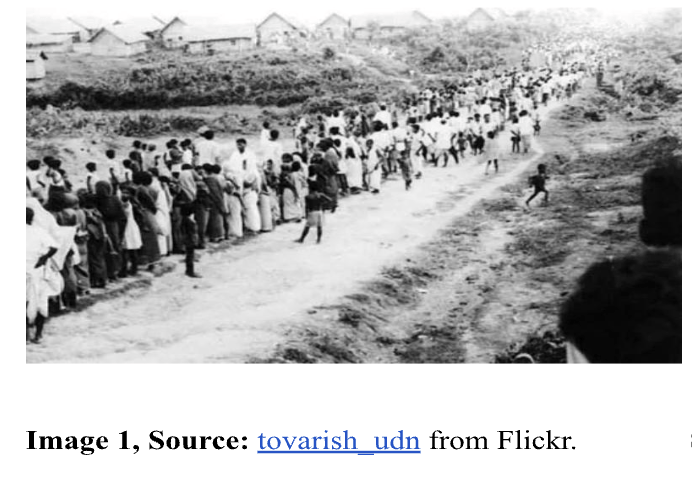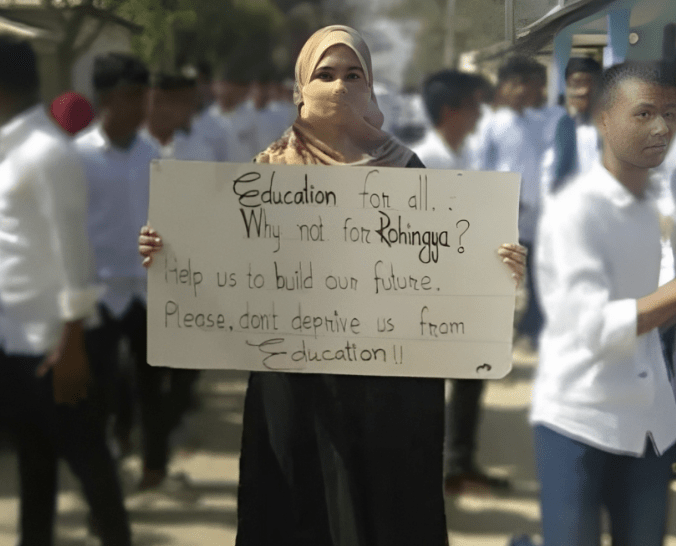Beyond the Camp: Is Education a Luxury? A Call for Rohingya Refugee Education and Global Justice
-Fahim Abrar Abid
School of Law, BRAC University
Introduction:
“When we open the water tap, it looks like blood is coming out” (Macdonald)
– Male 37, Mohammadpur, Dhaka, Bangladesh
These words reverberate with a haunting familiarity, encapsulating the struggles and sacrifices that refugees, both past and present, endure. This reflection emerged from the heart of the ‘Bihari Camp,’ nestled at the heart of Dhaka, the capital city of Bangladesh, a mere stone’s throw away from the seat of power, the Gonovobon (Residence of the Prime Minister). The Bihari community, once refugees themselves, now holds citizenship status, marking a triumph over decades of displacement. However, amidst these stories of triumph, a new narrative unfolds—the story of the Rohingya refugees fleeing the brutal clutches of persecution in Myanmar to seek solace in Bangladesh. The Rohingya refugees, whose quest for refuge has been met with complex challenges and a struggle for a fundamental right- the Right to Education. Through the lens of global justice, the importance of Rohingya refugee education and advocacy for a just and equitable future beyond the confines of refugee camps.
Contextualizing the Struggle:
Bangladesh’s own journey of independence in 1971 bore witness to a wave of displacement, reshaping the demographic and political landscape of the region. The echoes of the 1971 War of Liberation led to mass migrations, with millions of individuals seeking refuge in neighbouring India. India, Bangladesh’s neighbour, witnessed one of the largest human migrations in history as millions sought refuge across the border. Indian refugee camps sheltered an estimated 8 to 9 million migrants (Bangladesh Genocide Archive), and the Bangladeshi refugee count hovered around 10 million, according to National Geographic (September 1972). Image 1 captures the poignant scene of Bengali refugees embarking on a journey to India, seeking sanctuary from the horrors of the 1971 War of Liberation.

Despite the invaluable assistance extended by India during Bangladesh’s struggle for liberation, the nation has grappled with a complex legacy when it comes to treating its own refugees. While the world witnessed the generosity of Bangladesh in offering refuge to those in need, the Rohingya fleeing persecution, there remains a stark dissonance between the nation’s noble aspirations and the realities faced by refugees on its soil. This disheartening juxtaposition underscores the urgent need for a renewed commitment to human rights and global justice, as the promise of sanctuary and dignity must extend beyond mere rhetoric to create meaningful change for those seeking solace within its borders.
The Rohingya Reality:
The Bangladeshi government has expelled scores of Rohingya refugee children from schools in Bangladesh since late January 2019; officials have ordered secondary schools near the refugee settlements in the Cox’s Bazar district to dismiss Rohingya students who lack Bangladeshi citizenship (Human Rights Watch). Amidst the pages of history, another chapter is being written—the story of the Rohingya refugees. Escaping persecution in Myanmar, over 1.2 million Rohingya sought refuge in Bangladesh, a nation with its own complex relationship with displacement. As international attention turned towards the Rohingya crisis, the world observed how Bangladesh opened its borders and hearts to provide sanctuary to those in need. However, a closer examination reveals a disheartening reality- a narrative of limited access to education and restricted opportunities for Rohingya children.
“There are no opportunities for higher education for Rohingya people because they are not citizens of this country. They should return to their country because they are Myanmar’s displaced people. The government’s primary goal is to ensure their safe and dignified return to their homeland; providing higher education to Rohingya is not the host country’s mandate” (Kamruzzaman)
– Mohammed Mizanur Rahman,
Bangladesh’s Refugee Relief and Repatriation Commissioner
The statement underscores a deeply concerning perspective that negates the fundamental rights and aspirations of the Rohingya refugee community. While the government’s commitment to ensuring the safe repatriation of displaced individuals is commendable, it falls short of recognizing the urgent importance of education as a universal right. For 1.2M refugees, only primary education is provided to children as senior official details many challenges the host country faces in meeting this critical need (Kamruzzaman). Denying Rohingya refugees access to higher education based on their non-citizen status perpetuates a cycle of marginalization and vulnerability, hindering their capacity to rebuild their lives and contribute to their own and their host nation’s development.
The Nexus of Education and Global Justice:
Despite the noble intentions of providing refuge, the plight of Rohingya children’s education presents a sobering tale. In a bid to fulfill their right to education, Rohingya children find themselves restricted to a primary-level curriculum following the Myanmar syllabus. The aspiration for higher education remains a distant dream for these young minds, as official discourse echoes the sentiment that higher education is not the host country’s mandate.
“The Bangladeshi government’s policy of tracking down and expelling Rohingya refugee students instead of ensuring their right to education is misguided, tragic, and unlawful. Education is a basic human right. The solution to children feeling compelled to falsify their identities to go to secondary school isn’t to expel them but to let them get the education they deserve.” (Human Rights Watch)
Bill Van Esveld,
Senior Children’s Rights Researcher at Human Rights Watch
Education is the bedrock upon which societies flourish, ensuring a pathway towards empowerment, economic stability, and the ability to contribute to the greater good. Rohingya refugee education transcends mere literacy; it is the key that unlocks doors to a future unburdened by the traumas of the past. A just world recognizes education as a fundamental right that transcends citizenship and nationality. The principles of global justice come to life by embracing the plight of Rohingya refugees and acknowledging their right to education.
The Rohingya refugee children’s education quest mirrors the broader global justice struggle. Having access to a high-quality education enables people to escape the cycle of vulnerability and transforms them into change agents, peace ambassadors, and creators of a more just society. Investing in their education is an investment in the betterment of their community and the world at large. It is an assertion that the promise of justice is universal, cutting across boundaries to reach the most disadvantaged people.
A Call for Global Justice:
The education deficit faced by Rohingya children reflects a broader call for global justice. The international community has to recognize that education is a vital factor in determining the future of refugee children in the spirit of our common commitment to justice and human rights. Denying someone access to higher education feeds into cycles of vulnerability and reinforces an exclusionary narrative that goes against inclusivity and equity. All people’s rights and dignity must be respected, regardless of where they were born. This viewpoint urges a reassessment of policy priorities in order to guarantee a more inclusive and equitable approach to refugee education.

Conclusion:
In a world where distance is shrinking, and interconnectedness is magnified, the plight of Rohingya refugee education is a litmus test for our commitment to global justice. Resounding echoes of “When we open the water tap, it looks like blood is coming out” remind us of our collective duty to ensure that education- a ray of hope, is not a privilege afforded only to the fortunate. Joining forces to support education for Rohingya refugees would be a great gesture of solidarity and a declaration of our shared commitment to achieving global justice, as well as the belief that education is essential to a society that values each and every individual’s potential and dignity, no matter what their circumstances.
Works Cited
- “Bangladesh: Rohingya Refugee Students Expelled.” Human Rights Watch, 2 Apr. 2019, www.hrw.org/news/2019/04/01/bangladesh-rohingya-refugee-students-expelled.
- Kamruzzaman. “Lack of Higher Education Fuels Frustrations Among Rohingya in Bangladesh.” Anadolu Agency, 24 Mar. 2023, www.aa.com.tr/en/asia-pacific/lack-of-higher-education-fuels-frustrations-among-rohingya-in-bangladesh/2854805.
- Macdonald, Geoffrey. “Bangladesh: Urdu-Speaking ‘Biharis’ Seek Recognition, Respect and Rights.” International Republican Institute, 4 Feb. 2021, www.iri.org/resources/new-bangladesh-report-reveals-priorities-of-the-bihari-minority.
- “Refugees.” Bangladesh Genocide Archive, 14 Mar. 2012, www.genocidebangladesh.org/refugees.